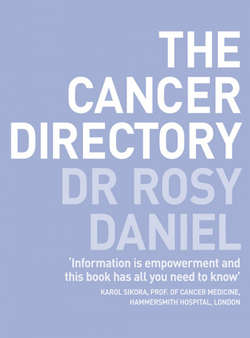Читать книгу The Cancer Directory - Dr. Daniel Rosy - Страница 47
Telling other people
ОглавлениеWhen you first become ill, especially if there is a health crisis or serious operation to go through, telling kind enquirers over and over again about what is happening can be very upsetting and draining, both for you and those close to you. Sometimes, it can help to delegate this task to a supporter who will be the message bearer, only putting through those you have placed on a special list.
As you emerge from the shock of the initial impact, it will be time to think about telling other people. You may initially feel like hiding what you are going through. A common reaction is to try to keep life as normal as possible, keeping what you are going through private. This is your choice and can be effective, but it can also be a stressful, lonely way to go about things, leaving you compromised at crucial moments when you may need help.
It is better, if possible, to enlist the help of friends and colleagues. Everything will be a lot easier if you can confide in those you work with so that they give you the best of their support now and in the future, and excuse from duties at short notice, if necessary. Of course, if you don’t want them to keep asking how you are, you can make this clear at the beginning. If you are asked something like this, be honest as it helps them know what to do.
The other big consideration is what you tell your family, particularly aged parents and children. Often, people do not tell their elderly parents what they are going through – partly to spare them the upset, and partly to spare themselves from having to deal with their reaction. Of course, everybody has to be the judge of their own situation but, if a parent is not given this information, you may be depriving yourself of a great deal of extra love and closeness that could come your way. Often, as hard as it may seem, giving somebody the opportunity to help you can be extremely important for them, helping them to feel valuable, and reassess their own values and priorities, too. It may even help an older person feel less depressed or sorry for themselves, putting their own worries into perspective and giving them a meaningful focus in terms of helping to care for you. This new closeness can sometimes be very healing for parent-child relationships that have gone awry in the past. Also, the older generation may have more experience and understanding to deal with illness and the concerns it creates. So, in the main, unless the individual concerned is very frail or the relationship is very conflicted, it is much better to be truthful about what is going on.
Deciding Whom to Tell
Whom do you need or want to tell?
Whom do you not want to tell?
What do you want to tell them about your situation, and how do you want them to be with you?
What ‘ground rules’ do you wish to set regarding confidentiality or the way you want them to interact with you?
Whose help will you enlist to tell others?
Who will tell them, what and when?
It is also good to be as honest as possible with your children. They will know that something is wrong even if you try to hide it from them. Being real with your children is probably the best education, gift and preparation for life you can ever give them. Children often have a better ability than adults to live in the present. This means that they tend to focus more on the way you are day by day rather than continuously looking at possible futures, which is what adults tend to do. However, what makes interactions with children easier is if you have managed to express your emotions and fears with your counsellor or close supporters before telling them. This will leave you in much more receptive state to allow them to express their feelings to you.
